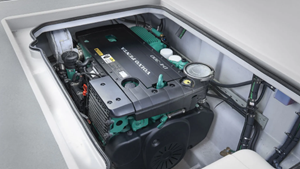News
Volvo Penta and CMB.TECH partner on dual-fuel H2 engines
Volvo Penta and CMB.TECH wish to announce a partnership agreement designed to accelerate the development of dual-fuel H2-powered solutions for both on land and at sea applications. This strengthened collaboration will include joint projects ranging from pilots to small scale industrialization, providing increased access to this important technology for reducing greenhouse gas emissions.
CMB.TECH owns, operates, and designs large marine and industrial applications powered by H2 and ammonia – fuels that we both manufacture and supply to our customers. Volvo Penta is a world-leading and global manufacturer of engines and complete power systems for boats, vessels, and industrial applications. The companies have worked together in pilot projects since 2017 successfully adapting Volvo Penta engines to run as a dual-fuel H2 and diesel solution via the conversion kit provided by CMB.TECH.
A low-carbon solution
The strengthened collaboration will create synergies aimed at leveraging the competences and product offerings of both companies – establishing dual-fuel H2 technology as a low-carbon interim solution before suitable zero-emissions alternatives become viable. It is an important step in Volvo Penta’s and CMB.TECH’s joint ambition to help accelerate their customers’ transition to net-zero emissions.
The partnership will cover pilot projects and small-scale industrialization of a H2 dual-fuel solution for selected customers.
“From the initial dual-fuel technology projects we have seen reductions of CO2 emissions up to 80%. It is clear that the energy transition is a major challenge in many types of applications. With the dual-fuel technology we have been developing over the last few years, we can provide a cost-effective and robust solution for a variety of applications. We think there is huge potential in this solution for customers, both on land and at sea,” said Roy Campe - Chief Technology Officer CMB.TECH.
The whole Volvo Group is working intensively to explore solutions to reduce – and ultimately eliminate – greenhouse gas emissions. Volvo Penta strives to team up with suppliers, partners, and customers to accelerate the journey into fossil-free fuels for both on land and at sea applications.
Dual-fuel technology
The dual-fuel solution’s main advantage is that it will heavily reduce the emissions of greenhouse gases while at the same time provide a robust and reliable solution. And, if H2 is not available, the application continues to run on traditional fuel, safeguarding productivity.
The design and testing of the H2-injection system will take place at CMB.TECH’s Technology and Development Centre in Brentwood, UK. Here, Volvo Penta engines will be tested to optimize the H2-diesel injection strategy for maximum reliability and emission savings.
“The development in this area is moving fast and with this partnership we see a great opportunity to further explore and be part of increasing the use and availability of hydrogen solutions. I believe that this dual-fuel approach will appeal to many of our customers by its ease of installation, maintenance, and use. In addition, it will help accelerate our customers’ transition to more sustainable operations,” said Heléne Mellquist - President of Volvo Penta.


